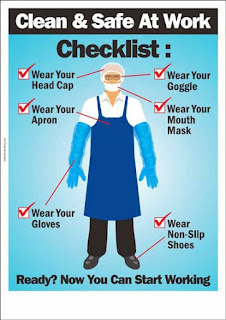Personal Safety and PPE
 Every
kitchen employee must lookout for their personal safety as it is very
important. Due to inadequate care and ignorance these issues may lead to
physical, sociological, financial or socio-economical losses or even possible
death, what could be more valuable than your survival?
Every
kitchen employee must lookout for their personal safety as it is very
important. Due to inadequate care and ignorance these issues may lead to
physical, sociological, financial or socio-economical losses or even possible
death, what could be more valuable than your survival?
Therefore
when working in a kitchen must take a good care and follow the required safety
procedure.
Use
a dry oven cloth, not a dirty wet tea-towel when carrying or using hot pots,
plates or dishes. Wet cloths carry the heat straight through to your hands or
skin and this will scald. If the item is really hot, you may drop the pot or
plate and cause more burns by spilling the hot food or liquid over yourself or
someone near you.
Use
goggles and masks (PPE) when handling cleaning chemicals or any chemicals that
may have strong fumes which may burn your eyes or throat. Some chemicals are
corrosive and may burn your throat or lungs if inhaled which is very painful.
The effect of these fumes is not always obvious at the time. After several
years problems start to show. The long-term effects of some of these products
may even result in permanent disability or death.
You
should NEVER lift and pour chemicals from a large container into a smaller one.
The large container may be too heavy and you could spill the chemical over
yourself or and anyone standing near you. This may cause a very serious bum to
one or both of you requiring emergency treatment somewhen possible death.
If
you have to transfer chemicals from large containers into smaller containers,
you should use pumps or taps.
When
lifting always keep your back straight and knees bent and lift with your legs.
A demo chart has attached in this manual for the easy access.
Make
sure you are trained how to use the equipment properly and safely at your
workplace
Some
tasks we do can be dangerous if we do not protect ourselves such as when we are
using chemicals or dangerous equipment. Many tasks we perform in a hospitality
environment will always carry some degree of risk to our safety.
When
equipment such as safety glasses, gloves, ear protection and safety clothing
are provided it is in your own best interests to wear and use this equipment
when carrying out these dangerous tasks
You
may need to use PPE when: i- Using a chemical to clean cooking equipment -
gloves and safety glasses



